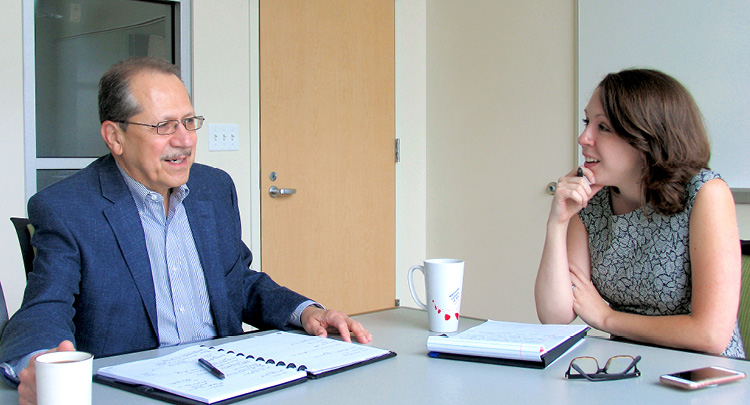Meet Dr. Juan Olivarez, the Johnson Center’s New Distinguished Scholar in Residence for Diversity, Equity, and Inclusion


Tory Martin: Dr. Olivarez, welcome to the Johnson Center! The Johnson Center and the local foundations who made this role possible see the Distinguished Scholar in Residence for Diversity, Equity, and Inclusion (DEI) position as a way of addressing a particular need in local and national philanthropy. How would you define that need?
Juan Olivarez: Certainly, understanding and serving the interest in the philanthropic field around social justice and equity continues to be a need. Fundamentally, philanthropy exists to facilitate a community response to a community need, yet stark gaps persist between the makeup of nonprofits themselves and the communities they serve. Of course, there is already great work being done here, but the critical question for us is: what more can we do, and what can we do more effectively?
The demographics are changing in the world and in our country, specifically. The majority of babies in the United States are now children of color, and the U.S. Census Bureau estimates that there are at least 350 different languages spoken in the United States. Philanthropy has the potential to touch all Americans, yet we still have the sense that we’re not truly reaching and assisting all communities enough. So, the need is to study, to look at best practices and to determine how we can influence the advancement of all of DEI, including efforts like talent pipelines to nonprofits and foundations. This is really a first step at looking at ourselves to determine how we can best serve others.
What will your work as the Distinguished Scholar in Residence look like?
The issues and questions around diversity, equity, and inclusion are very complex, and there’s so much room to learn. That’s why my first step will be focused on engaging with thought leaders in the community and the field. I want to begin by identifying the needs as our community understands and defines them, so that I can formulate a broader research agenda in support of local efforts as well as our sector. Data will also be an important part of this, to gather data to find out what we know, what we don’t know, what populations are advancing and which are facing intractable challenges.
A significant part of my work will be to find out what it looks like when DEI principles are truly part of the fiber of an organization. What does it look like when we don’t separate out DEI as an item on our agendas, but rather when we live it as an everyday thought process, as part of our organizational DNA? There are so many people interested today in talent development, for instance, and preparing the next generation. So for us, the question is: what can we do to influence that talent pipeline with the filters that today and tomorrow’s talent needs in order to work in this more diverse community, this more diverse platform — whether it be business, education, or philanthropy.
This work is not a cookbook, it’s not a 10-step process; it’s a way of thinking. It’s a way of looking at things, of identifying what we believe we need in our communities so that we’re more connected and less separate.
How do you see this position serving local and national audiences?
I believe we have to make sure our work has a global perspective but a local practice. We have to keep the context broad because we exist in a global community; we can’t just look at ourselves in isolation. We will learn from an international and national scan to incorporate into our local efforts, and in turn share our learnings with a wide audience. This way we’re building a sector and a society where the local and the global inform each other, ultimately building something stronger. We also know this work will be iterative over time.
How does this position fit in with Grand Valley State University and serve students?
GVSU has a strong set of organizational values that permeates the student and faculty experiences and align well with this work. Being in higher education, being with the Johnson Center, which is a neutral convener and aggregator of expertise, is a perfect home for this role. Because we are tied to the university, we have access to all of the outstanding faculty and staff who are creating and utilizing knowledge in every field, and to the undergraduate and graduate students who will be doing this work in their professional futures. I’m hoping to be able to work with all of these potential partners, to collaborate with faculty from sociology, economics, and other departments that might have a connection or interest in the work of philanthropy and how it applies to the community. And to work with students to explore opportunities for research, problem solving and more.
GVSU’s Office of Equity and Inclusion also already does a great deal of work internally with students around DEI principles and getting students out into the community. I’m hoping to work closely with them through my time here, and with my new colleagues in the College of Community and Public Service.
The Distinguished Scholar in Resident for Diversity, Equity, and Inclusion was created from the vision of several local funders who wanted to find a way to respond to the need for more inclusive and equitable philanthropic work in a way that would serve the entire field.